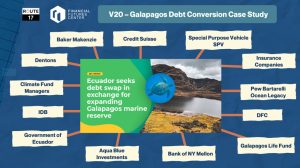Climate change policies that occur in one nation can have significant macro-critical implications in other countries, but to date, there has been limited attention to transition spillover risks in the world economy.
A new policy brief from the Task Force on Climate, Development and the International Monetary Fund seeks to address this knowledge gap. It synthesizes two new technical papers on this ‘transition spillover risk’ and outlines key policy recommendations for the International Monetary Fund (IMF) and beyond. As the only rules-based, multilateral institution charged with maintaining the financial stability of the global economy, it is paramount that the IMF incorporate transition spillover risk analysis in its surveillance activities and support countries in identifying early policies and investments that can prevent and mitigate such risks.
The first paper examines the welfare and macroeconomic implications for vulnerable, carbon-exporting countries of the European Union’s (EU) Carbon Border Adjustment Measure (CBAM). The authors find that a European CBAM would adversely impact exports and welfare in many developing countries, widening the gap in welfare and income between rich and poor economies. The CBAM may also erode the ability for low-income countries to effectively decarbonize their economies.
A second paper assesses the extent to which the introduction of a carbon tax in China, aligned with the scenarios of the Network for Greening the Financial System (NGFS), would ultimately lead to a coal phase-out in China that impacts Indonesia’s economy. The authors find that this climate transition spillover risk introduces a trade-off: on one hand, it would be quite significant for Indonesia by adversely impacting its balance of payments, financial stability and economic growth, given that China currently imports a large share of Indonesian coal. On the other hand, however, the Chinese coal phase-out would also reduce carbon dioxide emissions in Indonesia, mostly due to lower mining emissions.
Overall, the papers underscore how the IMF has a key role to play in both identifying and addressing transition spillover risks of climate policies, especially those impacting vulnerable countries.
Key policy recommendations:
- The IMF should enhance surveillance efforts to help member states identify, prevent and mitigate transition spillover risks.
- The IMF should retool and improve modeling approaches that can capture spillover risk transmission channels, estimate probable impacts and identify risk mitigation options. These papers introduce a crucial baseline for two such modeling approaches.
- The IMF should assist countries in building resilience to the spillover shocks by diversifying economies and working with multilateral development banks (MDBs) to mobilize resources for a structural transformation.
- The IMF should use specific instruments to help countries address spillover risks, such as the proposed Resilience and Sustainability Trust (RST) or an Equitable Decarbonization Fund (EDF) that is resourced through revenue generated from CBAMs and re-channels resources back to carbon-intensive developing countries to support green transition efforts.




